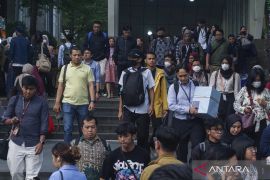Social assistance will have an impact on the growth of the gross domestic product (GDP) of 0.0067 percent, he observed during "The Impact of the Increase in Fuel Prices on the Economic Sector in Indonesia" event held by BRIN, which was followed online from here on Monday.
"The increase in fuel prices and social assistance will still have a positive impact on GDP, although it will be very small," he pointed out.
According to Hermawan, social assistance will minimize the contractions in the national economy caused by the increase in fuel prices.
It will help maintain the decline in people's purchasing power at 0.18 percent and the increase in inflation at 1.17 percent, he noted.
He further said that social assistance will also help maintain the decline in the value of exports at 0.30 percent and the decline in the value of imports at 0.64 percent.
Meanwhile, the fuel price adjustment will improve the performance of the technology industry as well as the oil and gas industry, he added. It will also boost the performance of the machinery and equipment sector by 3.2 percent, the natural gas and geothermal sector by 0.36 percent, and mining by 0.28 percent.
However, the adjustment in fuel prices will reduce the performance of the processing and transportation industries, for instance, the performance of the electronics and equipment sector will decline by 0.62 percent, air transportation services by 0.65 percent, and land transportation services by 0.17 percent.
Currently, the government is providing social assistance worth Rp24.17 trillion to maintain the people's purchasing power following the increase in fuel prices. The assistance includes Rp12.4 trillion in cash assistance (BLT), Rp9.6 trillion in wage subsidy assistance (BSU), and Rp2.17 trillion in transportation subsidies.
Related news: Ministry sends aid for quake victims in North Tapanuli
Related news: Ministry guarantees smooth distribution of social aid in 3T areas
Translator: Muhammad Heriyanto, Raka Adji
Editor: Rahmad Nasution
Copyright © ANTARA 2022












